BMP4002: Business Law - Legal System and Employment Law
VerifiedAdded on 2023/06/06
|10
|2843
|77
Report
AI Summary
This report provides a comprehensive overview of UK business law, beginning with a definition of law and its application within a business context. It details the classifications of law, specifically civil and criminal law, providing examples within the English legal system. The report then explains the roles of the High Court and Supreme Court. Further, it explores the sources of law, focusing on case law and the process of making legislation, including delegated legislation. The final section analyzes the UK law-making process concerning employment law, covering statutory duties of employers, and wrongful/unfair dismissal actions. The report aims to provide a clear understanding of the legal framework governing businesses in the UK.
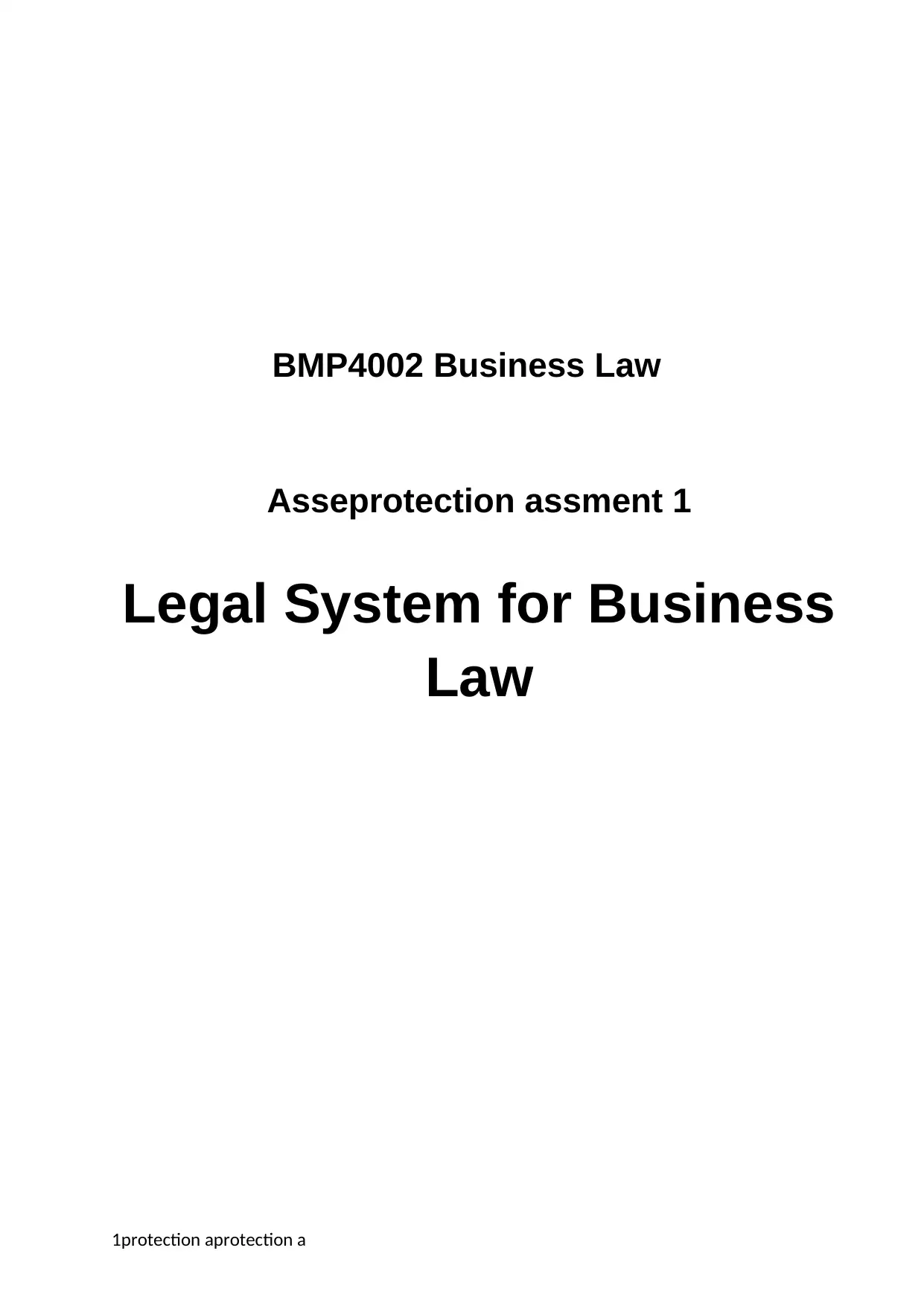
BMP4002 Business Law
Asseprotection assment 1
Legal System for Business
Law
1protection aprotection a
Asseprotection assment 1
Legal System for Business
Law
1protection aprotection a
Paraphrase This Document
Need a fresh take? Get an instant paraphrase of this document with our AI Paraphraser
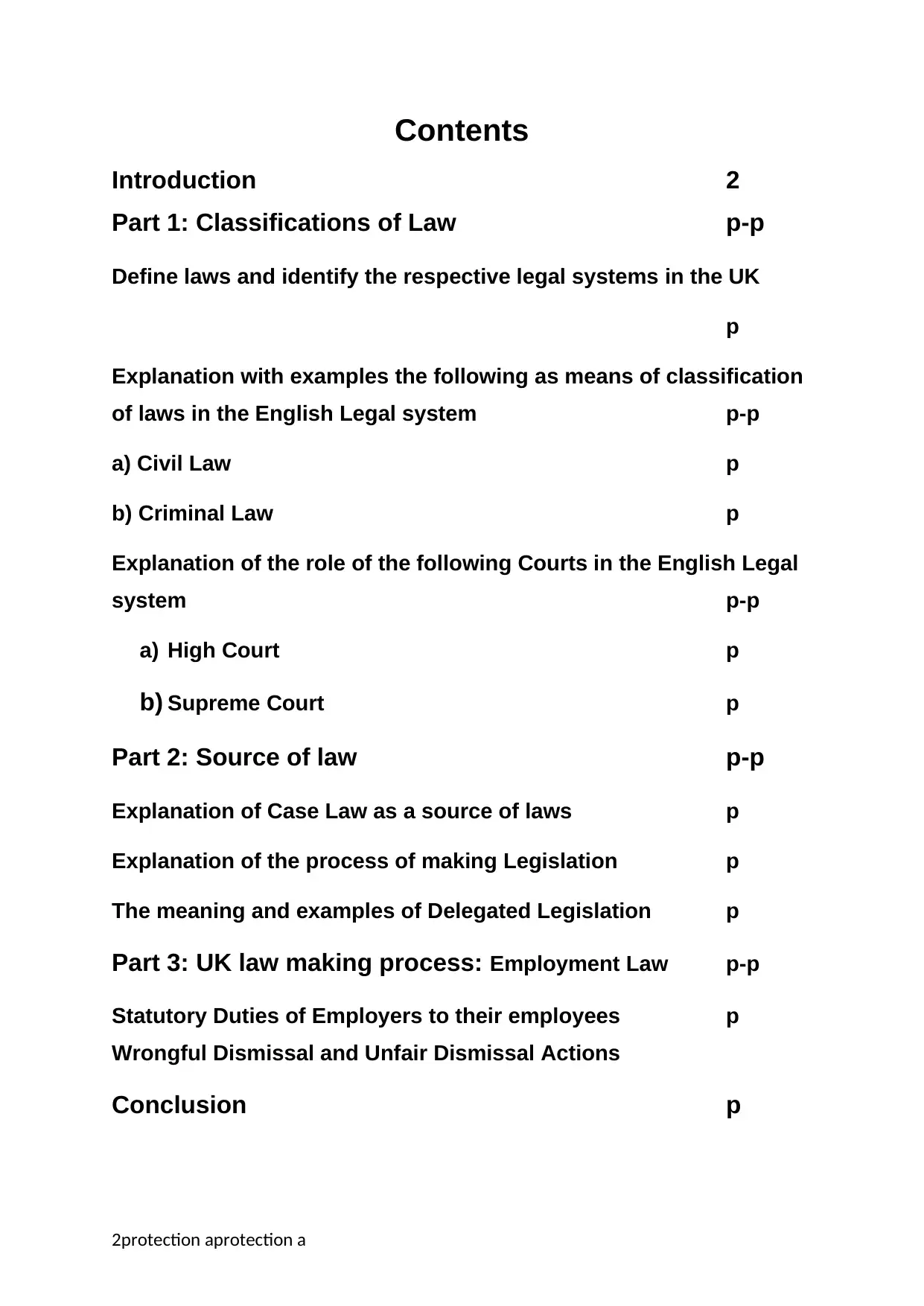
Contents
Introduction 2
Part 1: Classifications of Law p-p
Define laws and identify the respective legal systems in the UK
p
Explanation with examples the following as means of classification
of laws in the English Legal system p-p
a) Civil Law p
b) Criminal Law p
Explanation of the role of the following Courts in the English Legal
system p-p
a) High Court p
b) Supreme Court p
Part 2: Source of law p-p
Explanation of Case Law as a source of laws p
Explanation of the process of making Legislation p
The meaning and examples of Delegated Legislation p
Part 3: UK law making process: Employment Law p-p
Statutory Duties of Employers to their employees p
Wrongful Dismissal and Unfair Dismissal Actions
Conclusion p
2protection aprotection a
Introduction 2
Part 1: Classifications of Law p-p
Define laws and identify the respective legal systems in the UK
p
Explanation with examples the following as means of classification
of laws in the English Legal system p-p
a) Civil Law p
b) Criminal Law p
Explanation of the role of the following Courts in the English Legal
system p-p
a) High Court p
b) Supreme Court p
Part 2: Source of law p-p
Explanation of Case Law as a source of laws p
Explanation of the process of making Legislation p
The meaning and examples of Delegated Legislation p
Part 3: UK law making process: Employment Law p-p
Statutory Duties of Employers to their employees p
Wrongful Dismissal and Unfair Dismissal Actions
Conclusion p
2protection aprotection a

3protection aprotection a
⊘ This is a preview!⊘
Do you want full access?
Subscribe today to unlock all pages.

Trusted by 1+ million students worldwide
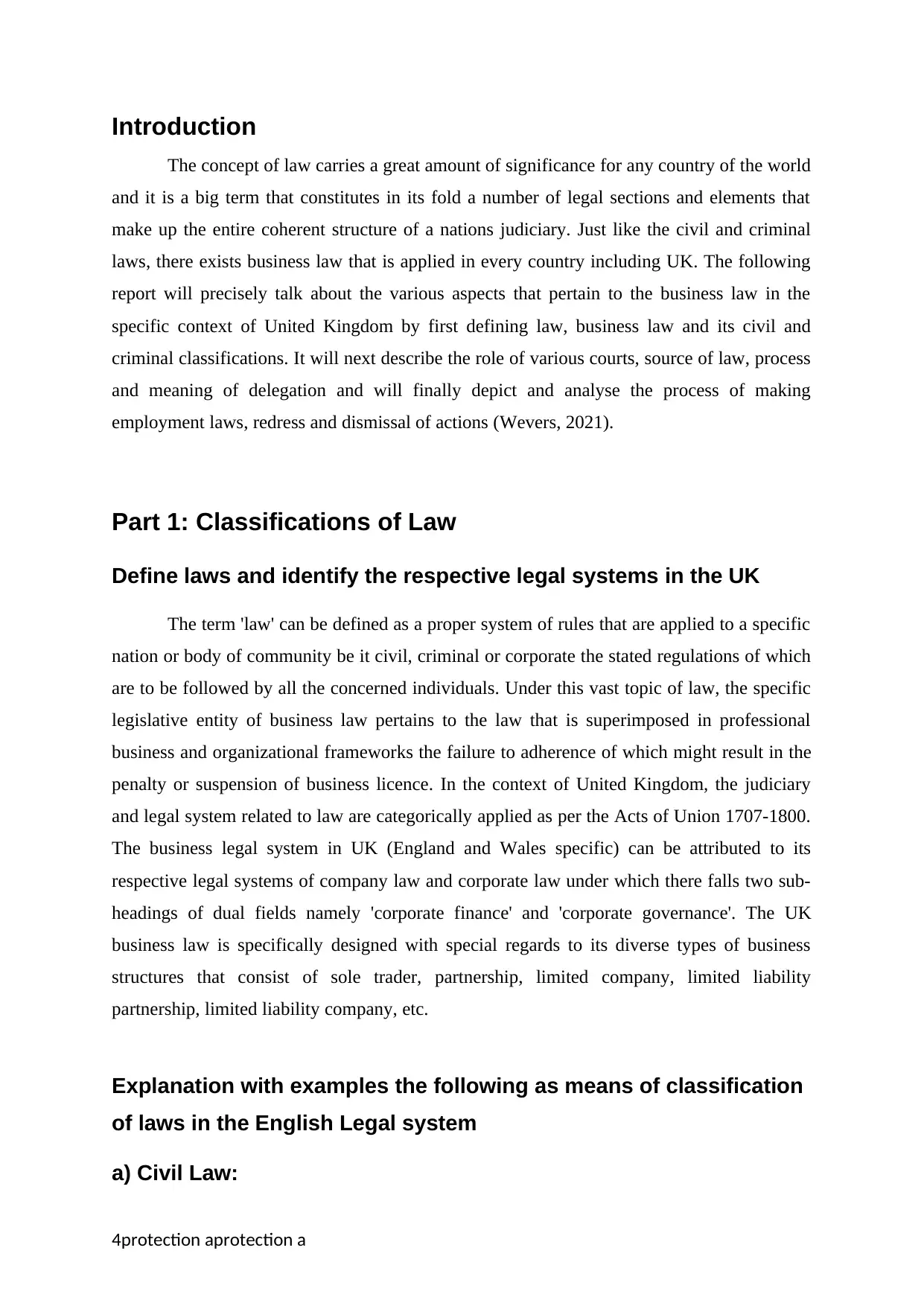
Introduction
The concept of law carries a great amount of significance for any country of the world
and it is a big term that constitutes in its fold a number of legal sections and elements that
make up the entire coherent structure of a nations judiciary. Just like the civil and criminal
laws, there exists business law that is applied in every country including UK. The following
report will precisely talk about the various aspects that pertain to the business law in the
specific context of United Kingdom by first defining law, business law and its civil and
criminal classifications. It will next describe the role of various courts, source of law, process
and meaning of delegation and will finally depict and analyse the process of making
employment laws, redress and dismissal of actions (Wevers, 2021).
Part 1: Classifications of Law
Define laws and identify the respective legal systems in the UK
The term 'law' can be defined as a proper system of rules that are applied to a specific
nation or body of community be it civil, criminal or corporate the stated regulations of which
are to be followed by all the concerned individuals. Under this vast topic of law, the specific
legislative entity of business law pertains to the law that is superimposed in professional
business and organizational frameworks the failure to adherence of which might result in the
penalty or suspension of business licence. In the context of United Kingdom, the judiciary
and legal system related to law are categorically applied as per the Acts of Union 1707-1800.
The business legal system in UK (England and Wales specific) can be attributed to its
respective legal systems of company law and corporate law under which there falls two sub-
headings of dual fields namely 'corporate finance' and 'corporate governance'. The UK
business law is specifically designed with special regards to its diverse types of business
structures that consist of sole trader, partnership, limited company, limited liability
partnership, limited liability company, etc.
Explanation with examples the following as means of classification
of laws in the English Legal system
a) Civil Law:
4protection aprotection a
The concept of law carries a great amount of significance for any country of the world
and it is a big term that constitutes in its fold a number of legal sections and elements that
make up the entire coherent structure of a nations judiciary. Just like the civil and criminal
laws, there exists business law that is applied in every country including UK. The following
report will precisely talk about the various aspects that pertain to the business law in the
specific context of United Kingdom by first defining law, business law and its civil and
criminal classifications. It will next describe the role of various courts, source of law, process
and meaning of delegation and will finally depict and analyse the process of making
employment laws, redress and dismissal of actions (Wevers, 2021).
Part 1: Classifications of Law
Define laws and identify the respective legal systems in the UK
The term 'law' can be defined as a proper system of rules that are applied to a specific
nation or body of community be it civil, criminal or corporate the stated regulations of which
are to be followed by all the concerned individuals. Under this vast topic of law, the specific
legislative entity of business law pertains to the law that is superimposed in professional
business and organizational frameworks the failure to adherence of which might result in the
penalty or suspension of business licence. In the context of United Kingdom, the judiciary
and legal system related to law are categorically applied as per the Acts of Union 1707-1800.
The business legal system in UK (England and Wales specific) can be attributed to its
respective legal systems of company law and corporate law under which there falls two sub-
headings of dual fields namely 'corporate finance' and 'corporate governance'. The UK
business law is specifically designed with special regards to its diverse types of business
structures that consist of sole trader, partnership, limited company, limited liability
partnership, limited liability company, etc.
Explanation with examples the following as means of classification
of laws in the English Legal system
a) Civil Law:
4protection aprotection a
Paraphrase This Document
Need a fresh take? Get an instant paraphrase of this document with our AI Paraphraser
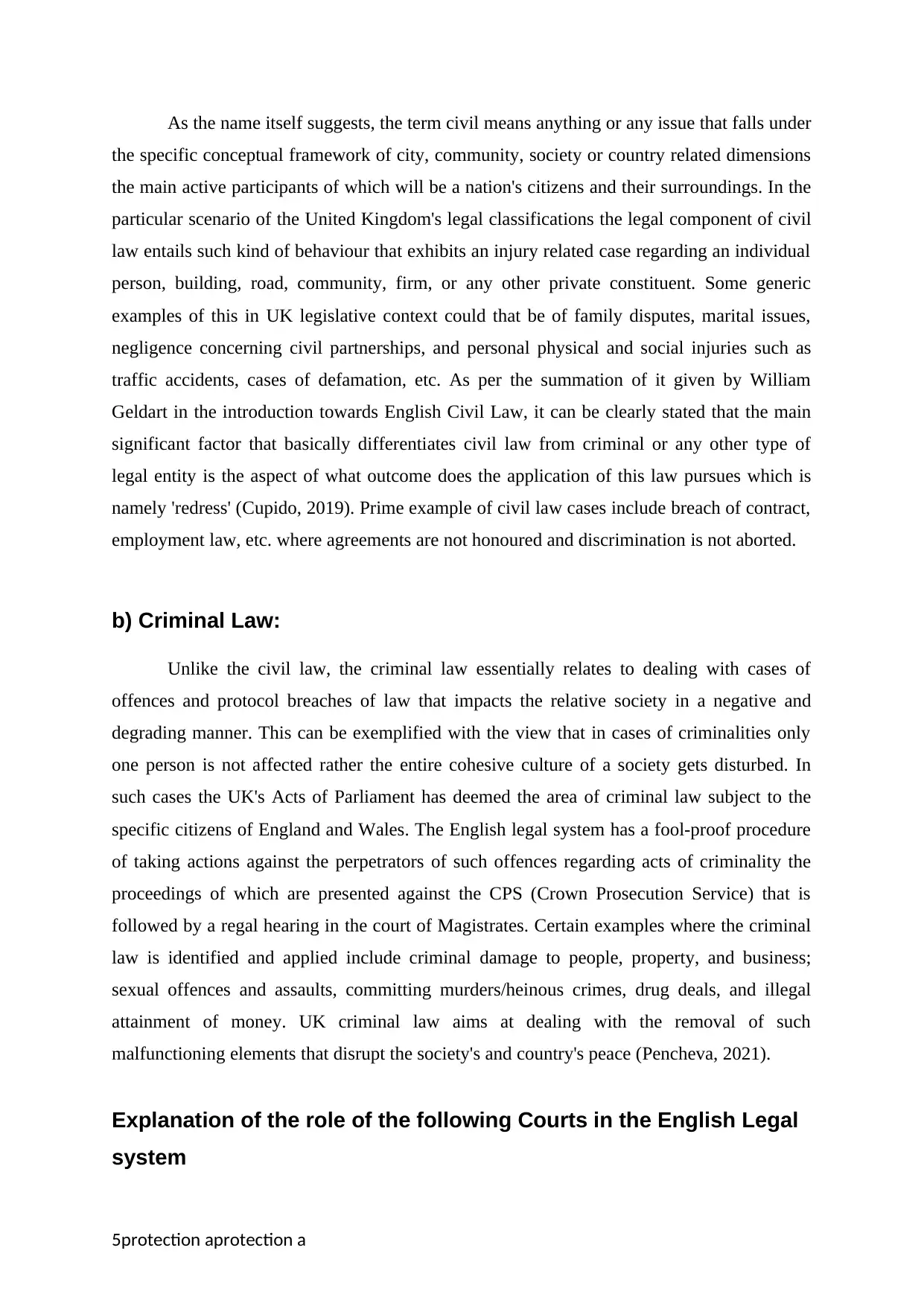
As the name itself suggests, the term civil means anything or any issue that falls under
the specific conceptual framework of city, community, society or country related dimensions
the main active participants of which will be a nation's citizens and their surroundings. In the
particular scenario of the United Kingdom's legal classifications the legal component of civil
law entails such kind of behaviour that exhibits an injury related case regarding an individual
person, building, road, community, firm, or any other private constituent. Some generic
examples of this in UK legislative context could that be of family disputes, marital issues,
negligence concerning civil partnerships, and personal physical and social injuries such as
traffic accidents, cases of defamation, etc. As per the summation of it given by William
Geldart in the introduction towards English Civil Law, it can be clearly stated that the main
significant factor that basically differentiates civil law from criminal or any other type of
legal entity is the aspect of what outcome does the application of this law pursues which is
namely 'redress' (Cupido, 2019). Prime example of civil law cases include breach of contract,
employment law, etc. where agreements are not honoured and discrimination is not aborted.
b) Criminal Law:
Unlike the civil law, the criminal law essentially relates to dealing with cases of
offences and protocol breaches of law that impacts the relative society in a negative and
degrading manner. This can be exemplified with the view that in cases of criminalities only
one person is not affected rather the entire cohesive culture of a society gets disturbed. In
such cases the UK's Acts of Parliament has deemed the area of criminal law subject to the
specific citizens of England and Wales. The English legal system has a fool-proof procedure
of taking actions against the perpetrators of such offences regarding acts of criminality the
proceedings of which are presented against the CPS (Crown Prosecution Service) that is
followed by a regal hearing in the court of Magistrates. Certain examples where the criminal
law is identified and applied include criminal damage to people, property, and business;
sexual offences and assaults, committing murders/heinous crimes, drug deals, and illegal
attainment of money. UK criminal law aims at dealing with the removal of such
malfunctioning elements that disrupt the society's and country's peace (Pencheva, 2021).
Explanation of the role of the following Courts in the English Legal
system
5protection aprotection a
the specific conceptual framework of city, community, society or country related dimensions
the main active participants of which will be a nation's citizens and their surroundings. In the
particular scenario of the United Kingdom's legal classifications the legal component of civil
law entails such kind of behaviour that exhibits an injury related case regarding an individual
person, building, road, community, firm, or any other private constituent. Some generic
examples of this in UK legislative context could that be of family disputes, marital issues,
negligence concerning civil partnerships, and personal physical and social injuries such as
traffic accidents, cases of defamation, etc. As per the summation of it given by William
Geldart in the introduction towards English Civil Law, it can be clearly stated that the main
significant factor that basically differentiates civil law from criminal or any other type of
legal entity is the aspect of what outcome does the application of this law pursues which is
namely 'redress' (Cupido, 2019). Prime example of civil law cases include breach of contract,
employment law, etc. where agreements are not honoured and discrimination is not aborted.
b) Criminal Law:
Unlike the civil law, the criminal law essentially relates to dealing with cases of
offences and protocol breaches of law that impacts the relative society in a negative and
degrading manner. This can be exemplified with the view that in cases of criminalities only
one person is not affected rather the entire cohesive culture of a society gets disturbed. In
such cases the UK's Acts of Parliament has deemed the area of criminal law subject to the
specific citizens of England and Wales. The English legal system has a fool-proof procedure
of taking actions against the perpetrators of such offences regarding acts of criminality the
proceedings of which are presented against the CPS (Crown Prosecution Service) that is
followed by a regal hearing in the court of Magistrates. Certain examples where the criminal
law is identified and applied include criminal damage to people, property, and business;
sexual offences and assaults, committing murders/heinous crimes, drug deals, and illegal
attainment of money. UK criminal law aims at dealing with the removal of such
malfunctioning elements that disrupt the society's and country's peace (Pencheva, 2021).
Explanation of the role of the following Courts in the English Legal
system
5protection aprotection a
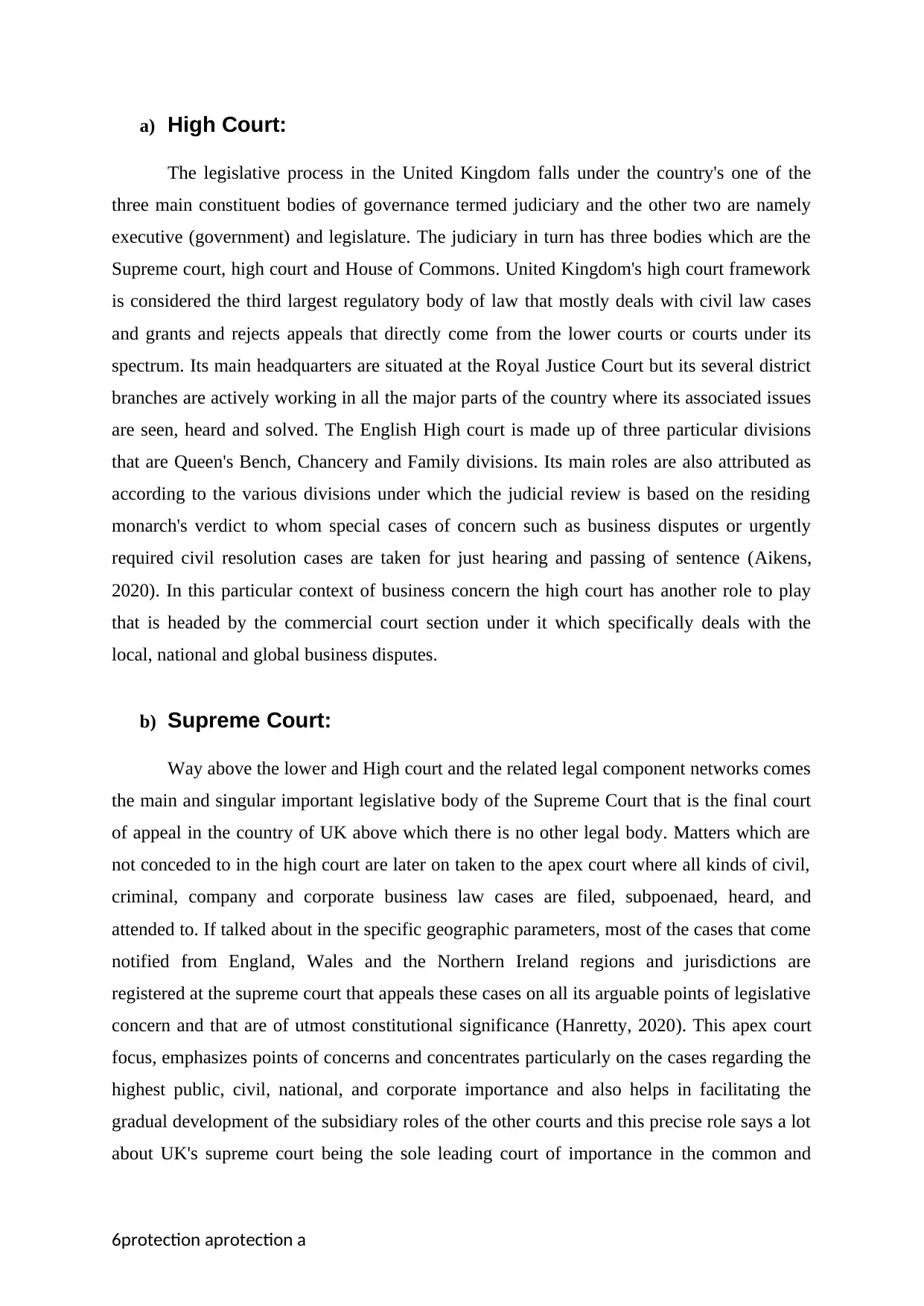
a) High Court:
The legislative process in the United Kingdom falls under the country's one of the
three main constituent bodies of governance termed judiciary and the other two are namely
executive (government) and legislature. The judiciary in turn has three bodies which are the
Supreme court, high court and House of Commons. United Kingdom's high court framework
is considered the third largest regulatory body of law that mostly deals with civil law cases
and grants and rejects appeals that directly come from the lower courts or courts under its
spectrum. Its main headquarters are situated at the Royal Justice Court but its several district
branches are actively working in all the major parts of the country where its associated issues
are seen, heard and solved. The English High court is made up of three particular divisions
that are Queen's Bench, Chancery and Family divisions. Its main roles are also attributed as
according to the various divisions under which the judicial review is based on the residing
monarch's verdict to whom special cases of concern such as business disputes or urgently
required civil resolution cases are taken for just hearing and passing of sentence (Aikens,
2020). In this particular context of business concern the high court has another role to play
that is headed by the commercial court section under it which specifically deals with the
local, national and global business disputes.
b) Supreme Court:
Way above the lower and High court and the related legal component networks comes
the main and singular important legislative body of the Supreme Court that is the final court
of appeal in the country of UK above which there is no other legal body. Matters which are
not conceded to in the high court are later on taken to the apex court where all kinds of civil,
criminal, company and corporate business law cases are filed, subpoenaed, heard, and
attended to. If talked about in the specific geographic parameters, most of the cases that come
notified from England, Wales and the Northern Ireland regions and jurisdictions are
registered at the supreme court that appeals these cases on all its arguable points of legislative
concern and that are of utmost constitutional significance (Hanretty, 2020). This apex court
focus, emphasizes points of concerns and concentrates particularly on the cases regarding the
highest public, civil, national, and corporate importance and also helps in facilitating the
gradual development of the subsidiary roles of the other courts and this precise role says a lot
about UK's supreme court being the sole leading court of importance in the common and
6protection aprotection a
The legislative process in the United Kingdom falls under the country's one of the
three main constituent bodies of governance termed judiciary and the other two are namely
executive (government) and legislature. The judiciary in turn has three bodies which are the
Supreme court, high court and House of Commons. United Kingdom's high court framework
is considered the third largest regulatory body of law that mostly deals with civil law cases
and grants and rejects appeals that directly come from the lower courts or courts under its
spectrum. Its main headquarters are situated at the Royal Justice Court but its several district
branches are actively working in all the major parts of the country where its associated issues
are seen, heard and solved. The English High court is made up of three particular divisions
that are Queen's Bench, Chancery and Family divisions. Its main roles are also attributed as
according to the various divisions under which the judicial review is based on the residing
monarch's verdict to whom special cases of concern such as business disputes or urgently
required civil resolution cases are taken for just hearing and passing of sentence (Aikens,
2020). In this particular context of business concern the high court has another role to play
that is headed by the commercial court section under it which specifically deals with the
local, national and global business disputes.
b) Supreme Court:
Way above the lower and High court and the related legal component networks comes
the main and singular important legislative body of the Supreme Court that is the final court
of appeal in the country of UK above which there is no other legal body. Matters which are
not conceded to in the high court are later on taken to the apex court where all kinds of civil,
criminal, company and corporate business law cases are filed, subpoenaed, heard, and
attended to. If talked about in the specific geographic parameters, most of the cases that come
notified from England, Wales and the Northern Ireland regions and jurisdictions are
registered at the supreme court that appeals these cases on all its arguable points of legislative
concern and that are of utmost constitutional significance (Hanretty, 2020). This apex court
focus, emphasizes points of concerns and concentrates particularly on the cases regarding the
highest public, civil, national, and corporate importance and also helps in facilitating the
gradual development of the subsidiary roles of the other courts and this precise role says a lot
about UK's supreme court being the sole leading court of importance in the common and
6protection aprotection a
⊘ This is a preview!⊘
Do you want full access?
Subscribe today to unlock all pages.

Trusted by 1+ million students worldwide
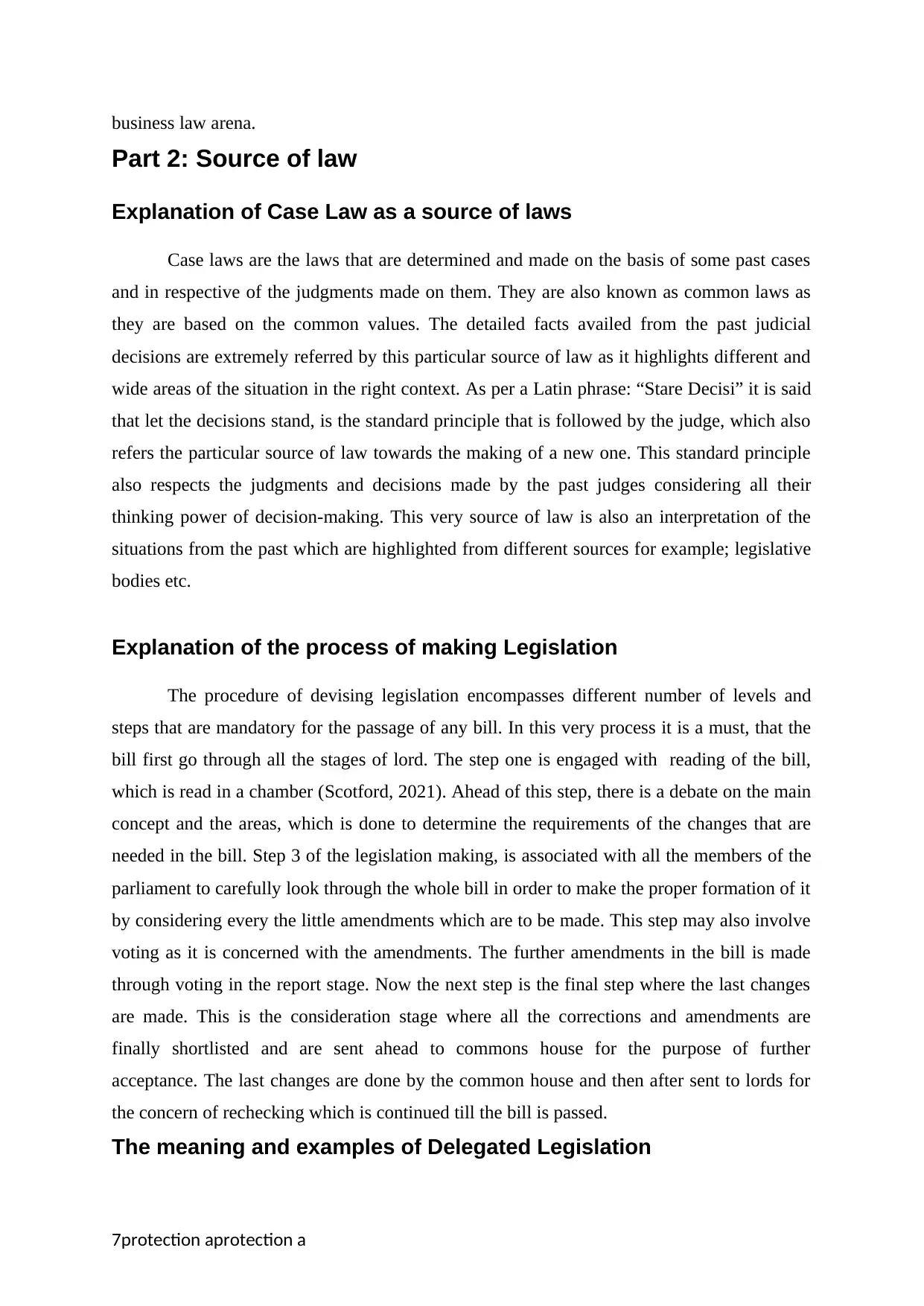
business law arena.
Part 2: Source of law
Explanation of Case Law as a source of laws
Case laws are the laws that are determined and made on the basis of some past cases
and in respective of the judgments made on them. They are also known as common laws as
they are based on the common values. The detailed facts availed from the past judicial
decisions are extremely referred by this particular source of law as it highlights different and
wide areas of the situation in the right context. As per a Latin phrase: “Stare Decisi” it is said
that let the decisions stand, is the standard principle that is followed by the judge, which also
refers the particular source of law towards the making of a new one. This standard principle
also respects the judgments and decisions made by the past judges considering all their
thinking power of decision-making. This very source of law is also an interpretation of the
situations from the past which are highlighted from different sources for example; legislative
bodies etc.
Explanation of the process of making Legislation
The procedure of devising legislation encompasses different number of levels and
steps that are mandatory for the passage of any bill. In this very process it is a must, that the
bill first go through all the stages of lord. The step one is engaged with reading of the bill,
which is read in a chamber (Scotford, 2021). Ahead of this step, there is a debate on the main
concept and the areas, which is done to determine the requirements of the changes that are
needed in the bill. Step 3 of the legislation making, is associated with all the members of the
parliament to carefully look through the whole bill in order to make the proper formation of it
by considering every the little amendments which are to be made. This step may also involve
voting as it is concerned with the amendments. The further amendments in the bill is made
through voting in the report stage. Now the next step is the final step where the last changes
are made. This is the consideration stage where all the corrections and amendments are
finally shortlisted and are sent ahead to commons house for the purpose of further
acceptance. The last changes are done by the common house and then after sent to lords for
the concern of rechecking which is continued till the bill is passed.
The meaning and examples of Delegated Legislation
7protection aprotection a
Part 2: Source of law
Explanation of Case Law as a source of laws
Case laws are the laws that are determined and made on the basis of some past cases
and in respective of the judgments made on them. They are also known as common laws as
they are based on the common values. The detailed facts availed from the past judicial
decisions are extremely referred by this particular source of law as it highlights different and
wide areas of the situation in the right context. As per a Latin phrase: “Stare Decisi” it is said
that let the decisions stand, is the standard principle that is followed by the judge, which also
refers the particular source of law towards the making of a new one. This standard principle
also respects the judgments and decisions made by the past judges considering all their
thinking power of decision-making. This very source of law is also an interpretation of the
situations from the past which are highlighted from different sources for example; legislative
bodies etc.
Explanation of the process of making Legislation
The procedure of devising legislation encompasses different number of levels and
steps that are mandatory for the passage of any bill. In this very process it is a must, that the
bill first go through all the stages of lord. The step one is engaged with reading of the bill,
which is read in a chamber (Scotford, 2021). Ahead of this step, there is a debate on the main
concept and the areas, which is done to determine the requirements of the changes that are
needed in the bill. Step 3 of the legislation making, is associated with all the members of the
parliament to carefully look through the whole bill in order to make the proper formation of it
by considering every the little amendments which are to be made. This step may also involve
voting as it is concerned with the amendments. The further amendments in the bill is made
through voting in the report stage. Now the next step is the final step where the last changes
are made. This is the consideration stage where all the corrections and amendments are
finally shortlisted and are sent ahead to commons house for the purpose of further
acceptance. The last changes are done by the common house and then after sent to lords for
the concern of rechecking which is continued till the bill is passed.
The meaning and examples of Delegated Legislation
7protection aprotection a
Paraphrase This Document
Need a fresh take? Get an instant paraphrase of this document with our AI Paraphraser
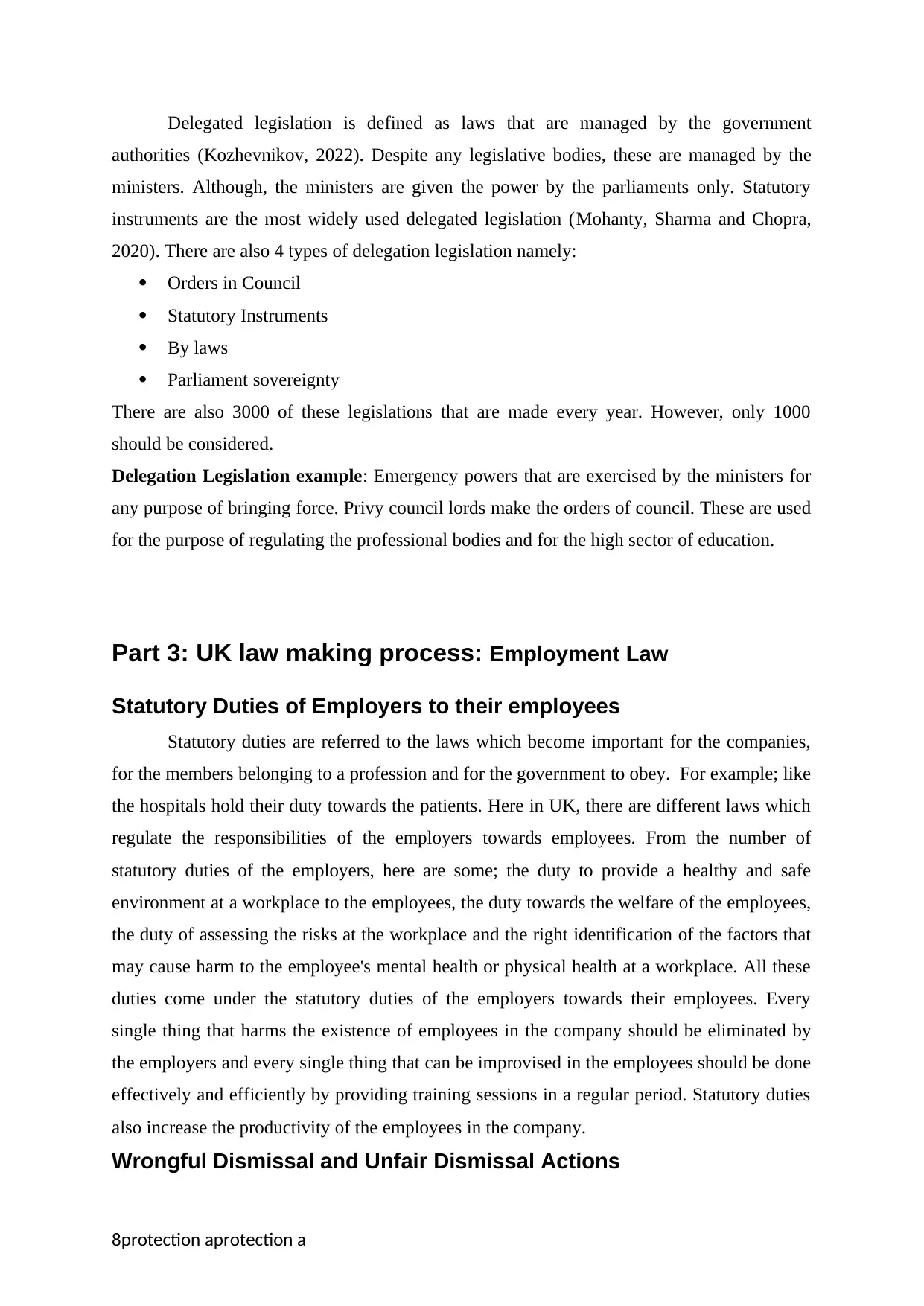
Delegated legislation is defined as laws that are managed by the government
authorities (Kozhevnikov, 2022). Despite any legislative bodies, these are managed by the
ministers. Although, the ministers are given the power by the parliaments only. Statutory
instruments are the most widely used delegated legislation (Mohanty, Sharma and Chopra,
2020). There are also 4 types of delegation legislation namely:
Orders in Council
Statutory Instruments
By laws
Parliament sovereignty
There are also 3000 of these legislations that are made every year. However, only 1000
should be considered.
Delegation Legislation example: Emergency powers that are exercised by the ministers for
any purpose of bringing force. Privy council lords make the orders of council. These are used
for the purpose of regulating the professional bodies and for the high sector of education.
Part 3: UK law making process: Employment Law
Statutory Duties of Employers to their employees
Statutory duties are referred to the laws which become important for the companies,
for the members belonging to a profession and for the government to obey. For example; like
the hospitals hold their duty towards the patients. Here in UK, there are different laws which
regulate the responsibilities of the employers towards employees. From the number of
statutory duties of the employers, here are some; the duty to provide a healthy and safe
environment at a workplace to the employees, the duty towards the welfare of the employees,
the duty of assessing the risks at the workplace and the right identification of the factors that
may cause harm to the employee's mental health or physical health at a workplace. All these
duties come under the statutory duties of the employers towards their employees. Every
single thing that harms the existence of employees in the company should be eliminated by
the employers and every single thing that can be improvised in the employees should be done
effectively and efficiently by providing training sessions in a regular period. Statutory duties
also increase the productivity of the employees in the company.
Wrongful Dismissal and Unfair Dismissal Actions
8protection aprotection a
authorities (Kozhevnikov, 2022). Despite any legislative bodies, these are managed by the
ministers. Although, the ministers are given the power by the parliaments only. Statutory
instruments are the most widely used delegated legislation (Mohanty, Sharma and Chopra,
2020). There are also 4 types of delegation legislation namely:
Orders in Council
Statutory Instruments
By laws
Parliament sovereignty
There are also 3000 of these legislations that are made every year. However, only 1000
should be considered.
Delegation Legislation example: Emergency powers that are exercised by the ministers for
any purpose of bringing force. Privy council lords make the orders of council. These are used
for the purpose of regulating the professional bodies and for the high sector of education.
Part 3: UK law making process: Employment Law
Statutory Duties of Employers to their employees
Statutory duties are referred to the laws which become important for the companies,
for the members belonging to a profession and for the government to obey. For example; like
the hospitals hold their duty towards the patients. Here in UK, there are different laws which
regulate the responsibilities of the employers towards employees. From the number of
statutory duties of the employers, here are some; the duty to provide a healthy and safe
environment at a workplace to the employees, the duty towards the welfare of the employees,
the duty of assessing the risks at the workplace and the right identification of the factors that
may cause harm to the employee's mental health or physical health at a workplace. All these
duties come under the statutory duties of the employers towards their employees. Every
single thing that harms the existence of employees in the company should be eliminated by
the employers and every single thing that can be improvised in the employees should be done
effectively and efficiently by providing training sessions in a regular period. Statutory duties
also increase the productivity of the employees in the company.
Wrongful Dismissal and Unfair Dismissal Actions
8protection aprotection a
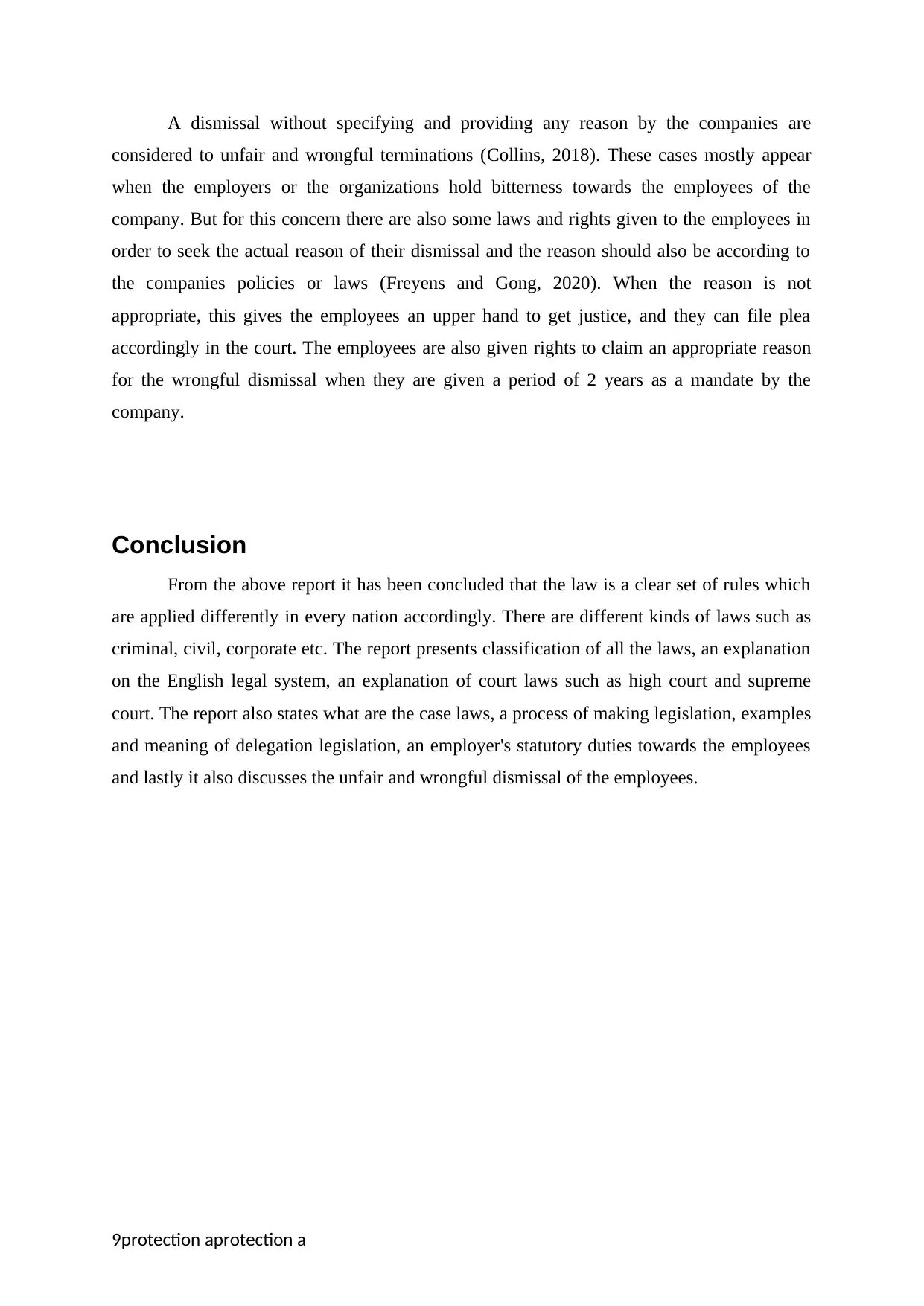
A dismissal without specifying and providing any reason by the companies are
considered to unfair and wrongful terminations (Collins, 2018). These cases mostly appear
when the employers or the organizations hold bitterness towards the employees of the
company. But for this concern there are also some laws and rights given to the employees in
order to seek the actual reason of their dismissal and the reason should also be according to
the companies policies or laws (Freyens and Gong, 2020). When the reason is not
appropriate, this gives the employees an upper hand to get justice, and they can file plea
accordingly in the court. The employees are also given rights to claim an appropriate reason
for the wrongful dismissal when they are given a period of 2 years as a mandate by the
company.
Conclusion
From the above report it has been concluded that the law is a clear set of rules which
are applied differently in every nation accordingly. There are different kinds of laws such as
criminal, civil, corporate etc. The report presents classification of all the laws, an explanation
on the English legal system, an explanation of court laws such as high court and supreme
court. The report also states what are the case laws, a process of making legislation, examples
and meaning of delegation legislation, an employer's statutory duties towards the employees
and lastly it also discusses the unfair and wrongful dismissal of the employees.
9protection aprotection a
considered to unfair and wrongful terminations (Collins, 2018). These cases mostly appear
when the employers or the organizations hold bitterness towards the employees of the
company. But for this concern there are also some laws and rights given to the employees in
order to seek the actual reason of their dismissal and the reason should also be according to
the companies policies or laws (Freyens and Gong, 2020). When the reason is not
appropriate, this gives the employees an upper hand to get justice, and they can file plea
accordingly in the court. The employees are also given rights to claim an appropriate reason
for the wrongful dismissal when they are given a period of 2 years as a mandate by the
company.
Conclusion
From the above report it has been concluded that the law is a clear set of rules which
are applied differently in every nation accordingly. There are different kinds of laws such as
criminal, civil, corporate etc. The report presents classification of all the laws, an explanation
on the English legal system, an explanation of court laws such as high court and supreme
court. The report also states what are the case laws, a process of making legislation, examples
and meaning of delegation legislation, an employer's statutory duties towards the employees
and lastly it also discusses the unfair and wrongful dismissal of the employees.
9protection aprotection a
⊘ This is a preview!⊘
Do you want full access?
Subscribe today to unlock all pages.

Trusted by 1+ million students worldwide
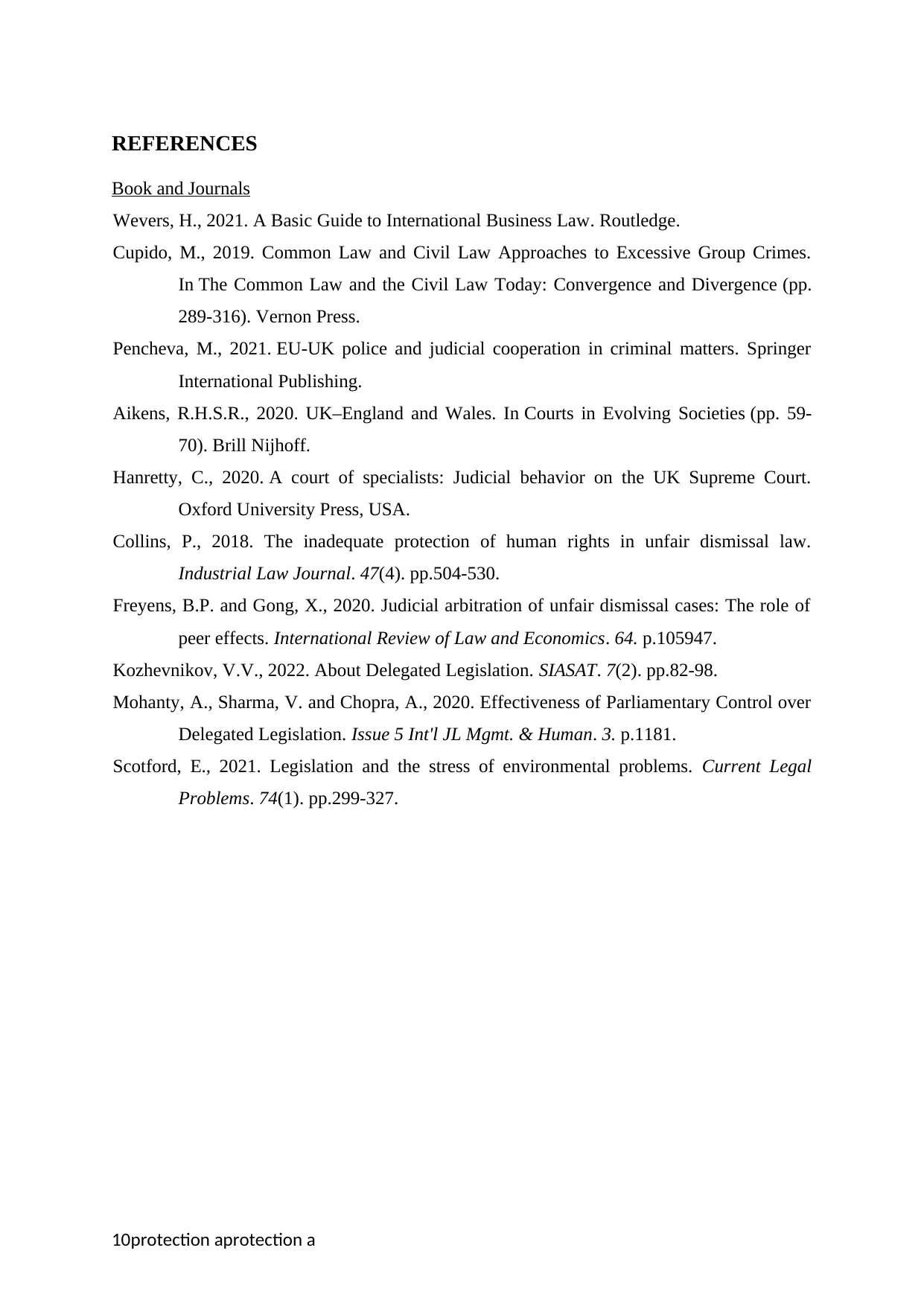
REFERENCES
Book and Journals
Wevers, H., 2021. A Basic Guide to International Business Law. Routledge.
Cupido, M., 2019. Common Law and Civil Law Approaches to Excessive Group Crimes.
In The Common Law and the Civil Law Today: Convergence and Divergence (pp.
289-316). Vernon Press.
Pencheva, M., 2021. EU-UK police and judicial cooperation in criminal matters. Springer
International Publishing.
Aikens, R.H.S.R., 2020. UK–England and Wales. In Courts in Evolving Societies (pp. 59-
70). Brill Nijhoff.
Hanretty, C., 2020. A court of specialists: Judicial behavior on the UK Supreme Court.
Oxford University Press, USA.
Collins, P., 2018. The inadequate protection of human rights in unfair dismissal law.
Industrial Law Journal. 47(4). pp.504-530.
Freyens, B.P. and Gong, X., 2020. Judicial arbitration of unfair dismissal cases: The role of
peer effects. International Review of Law and Economics. 64. p.105947.
Kozhevnikov, V.V., 2022. About Delegated Legislation. SIASAT. 7(2). pp.82-98.
Mohanty, A., Sharma, V. and Chopra, A., 2020. Effectiveness of Parliamentary Control over
Delegated Legislation. Issue 5 Int'l JL Mgmt. & Human. 3. p.1181.
Scotford, E., 2021. Legislation and the stress of environmental problems. Current Legal
Problems. 74(1). pp.299-327.
10protection aprotection a
Book and Journals
Wevers, H., 2021. A Basic Guide to International Business Law. Routledge.
Cupido, M., 2019. Common Law and Civil Law Approaches to Excessive Group Crimes.
In The Common Law and the Civil Law Today: Convergence and Divergence (pp.
289-316). Vernon Press.
Pencheva, M., 2021. EU-UK police and judicial cooperation in criminal matters. Springer
International Publishing.
Aikens, R.H.S.R., 2020. UK–England and Wales. In Courts in Evolving Societies (pp. 59-
70). Brill Nijhoff.
Hanretty, C., 2020. A court of specialists: Judicial behavior on the UK Supreme Court.
Oxford University Press, USA.
Collins, P., 2018. The inadequate protection of human rights in unfair dismissal law.
Industrial Law Journal. 47(4). pp.504-530.
Freyens, B.P. and Gong, X., 2020. Judicial arbitration of unfair dismissal cases: The role of
peer effects. International Review of Law and Economics. 64. p.105947.
Kozhevnikov, V.V., 2022. About Delegated Legislation. SIASAT. 7(2). pp.82-98.
Mohanty, A., Sharma, V. and Chopra, A., 2020. Effectiveness of Parliamentary Control over
Delegated Legislation. Issue 5 Int'l JL Mgmt. & Human. 3. p.1181.
Scotford, E., 2021. Legislation and the stress of environmental problems. Current Legal
Problems. 74(1). pp.299-327.
10protection aprotection a
1 out of 10
Related Documents
Your All-in-One AI-Powered Toolkit for Academic Success.
+13062052269
info@desklib.com
Available 24*7 on WhatsApp / Email
![[object Object]](/_next/static/media/star-bottom.7253800d.svg)
Unlock your academic potential
Copyright © 2020–2026 A2Z Services. All Rights Reserved. Developed and managed by ZUCOL.



